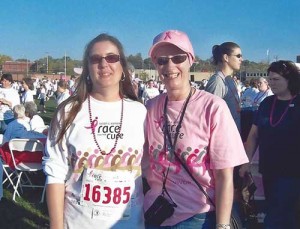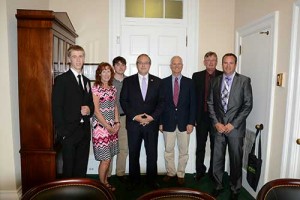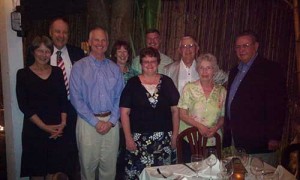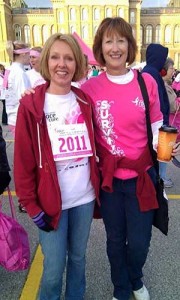Battling cancer as an industry

Debra Grooms, right, and Michelle Wicker, her assistant, participated in a Susan G. Komen Race for the Cure in 2007 as Grooms went through chemotherapy.
Photos courtesy of Debra Grooms and Wendy Gorham
Debra Grooms will never forget the Iowa Propane Gas Association’s March 2007 district meeting. While away from home for the meeting, Grooms, the association’s executive director, realized she might have breast cancer.
“I discovered a lump when I turned over in bed one of the nights I was traveling for work,” Grooms says.
As soon as she returned home from the meeting, Grooms set up several appointments with doctors near her Des Moines, Iowa, home. After a week of conversations and meetings with doctors, Grooms confirmed she had Stage IIB breast cancer.
Grooms had been the Iowa Propane Gas Association’s executive director for about 12 years when she learned of the diagnosis. She was a well-known face in the propane industry. She seldom missed Propane Days – senators and representatives knew her on a first-name basis. She also enjoyed meeting other people in the propane industry at the National Propane Gas Association’s Southeastern Convention & International Propane Expo.
Yet because of her diagnosis, Grooms skipped both of those events in 2007. Colleagues say they noticed her absence from those events that year.
Grooms quickly scheduled a lumpectomy after the diagnosis. Once doctors removed the breast cancer tumor, she started chemotherapy treatments by mid-April.
Despite having regular chemotherapy treatment appointments, Grooms barely missed a day of work. She intentionally kept busy during that time so she wouldn’t worry about her situation as much. At work, she stayed busy helping the Iowa Propane Gas Association approve the state’s Propane Education & Research Council (PERC) during her treatment period. Fortunately, her labor paid off, as the state PERC passed in early 2008.
Grooms admits it took guts to go to work after she lost her hair from chemotherapy treatments, but she simply covered her head with scarves and made herself push past any anxieties.
“Getting over the awkwardness of having no hair was the hardest part of the treatment period for me,” Grooms says. “But I couldn’t stay home. Many people told me the busier I stayed, the better I would feel. So I kept working, and it kept my mind off things.”
Deep bond

Grooms seldom misses Propane Days in Washington, D.C. At this year’s lobbying event, Rep. David Young, R-Iowa, fourth from left, met with Grooms and several other propane industry members from Iowa.
Cheerful cards, encouraging emails, pink-colored gifts and funny stories are some of the things people sent Grooms during her treatment period. Most of these things came from people in the propane industry.
Some people regularly connected with Grooms to support her during that time. Wendy Gorham, vice president of Northwest Gas in Grand Rapids, Minn., was one of those regulars.
Gorham and Grooms had been casual friends for more than a decade from running into each other at propane industry meetings. Grooms recalled Gorham survived fallopian tube cancer not too many years prior to her breast cancer diagnosis, so she wondered whether Gorham would have advice to share. Grooms contacted Gorham right after her diagnosis for Gorham’s insights.
In return for reaching out, Gorham sent a series of emails, phone calls and care packages to Grooms. Having experienced cancer, Gorham knew how important it was to share advice with Grooms throughout her treatment period. Although Gorham couldn’t commit to travel the more than 400 miles to visit Grooms, she could commit to correspond with her.
Both women agree their friendship grew during that period.
“Nobody should go through that procedure alone,” Gorham says. “It was comforting to me, knowing I was able to help her. Certainly our relationship changed during that. We built a special bond that’s never going to go away.”
Gorham adds she tried to make Grooms smile when they talked on the phone or emailed back and forth. She says smiling doesn’t cure cancer, but it helps a person to persevere.

Grooms, fourth from left, invited Wendy Gorham, far left, and her husband, Mike Gorham, second from left, to join members of the Iowa Propane Gas Association for dinner in Key West, Fla.
“You do have to laugh once in a while throughout the process,” she says. “You don’t have to, but it helps. One time, I sent [Grooms] a humor story from when I fought my battle with cancer. She immediately replied, ‘You had no idea how much I needed a laugh today.’”
In addition to developing a deeper friendship with Gorham, Grooms got closer to many in the propane industry that summer and fall. Dealers LP Equipment raised money for the American Cancer Society in her name at the company’s annual open house and golf outing that summer. Several members of the Iowa Propane Gas Association also joined Grooms to walk with her in the Susan G. Komen Race for the Cure event that year in Des Moines.
“Family, friends and the propane industry were some of the biggest means of support I got during the treatment period,” Grooms says.
Grooms finished her chemotherapy and radiation treatments by November 2007. About four years later, Grooms heard Gorham had been diagnosed with mutated BRCA1 genes, which greatly increased her likelihood of developing cancer again. Gorham opted to have a prophylactic surgery to remove at-risk tissue to prevent cancer from coming back. Grooms returned the favor to Gorham by sending her support letters and phone calls.
“[Grooms] knew exactly what I was going through when I was diagnosed with mutated BRCA1 gene cells,” Gorham says. “She’s a sincere person who means it when she tells you she’s praying and thinking about you.”
Extending support
Grooms and Gorham agree on the importance of banding together to support people going through cancer – especially people they know in the propane industry.

Grooms, right, shown here with her friend Deb Dullard, says she had many support lines when she had cancer.
Not long after Grooms finished treatment, she says Jenni McKeen, executive director of the Georgia Propane Gas Association, approached her for advice on how to handle her time battling cancer. The news of McKeen’s cancer came as a surprise to Grooms, but Grooms says she took time to help her colleague.
Three years later, Grooms says she and McKeen came alongside Jane Stroupe, area director for AmeriGas district offices in parts of South Carolina, North Carolina, Tennessee and Georgia, when they found out she had breast cancer.
“When Stroupe was diagnosed, [we] got together for lunch at Propane Days in D.C.,” Grooms says. “McKeen and I shared some of [our] experience on what to expect, and we let her know we were ready to support her.”
McKeen adds that she and Grooms have talked to numerous people in the industry who have been diagnosed with cancer to share the support with them.
“Everybody’s cancer diagnosis is different,” McKeen says. “But no matter how severe or minor the diagnosis, it’s nice to know you have a line of communication with people in the industry you work in.”
Gorham says sharing stories on battling cancer with those who are diagnosed is often highly valuable.
“Grooms and I are social people, so we are open to sharing our stories,” Gorham says. “I’ll tell mine or Grooms’ stories to strangers, if it will help them. My view is this: If your story can help one person, it’s worth sharing.”
Photos courtesy of Debra Grooms and Wendy Gorham
















